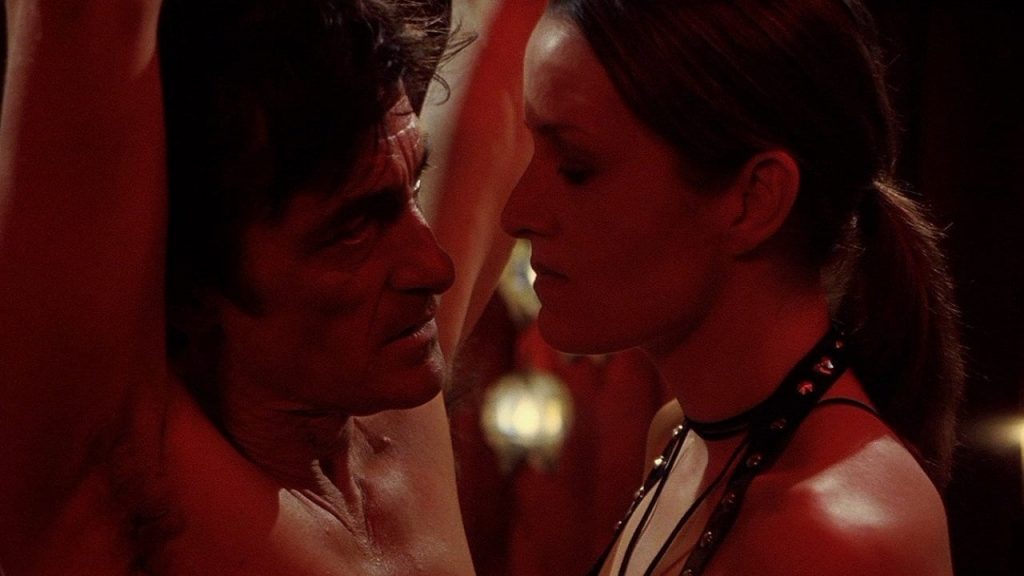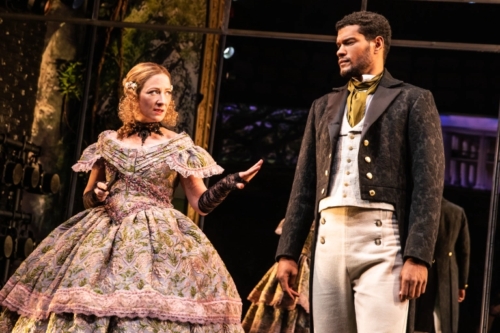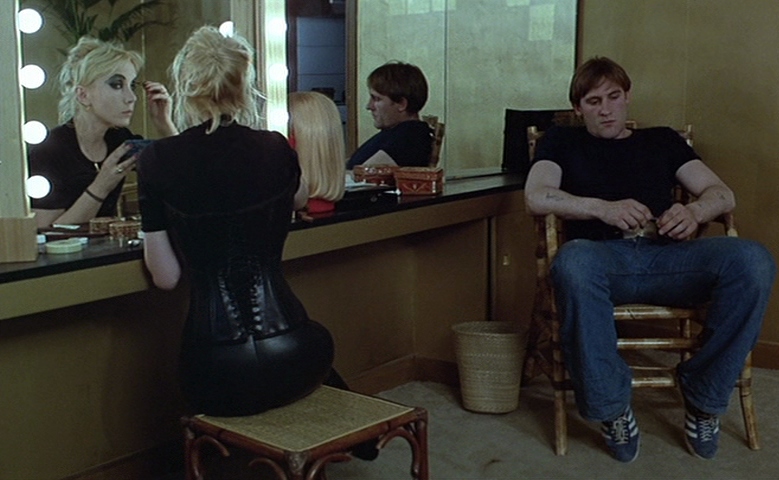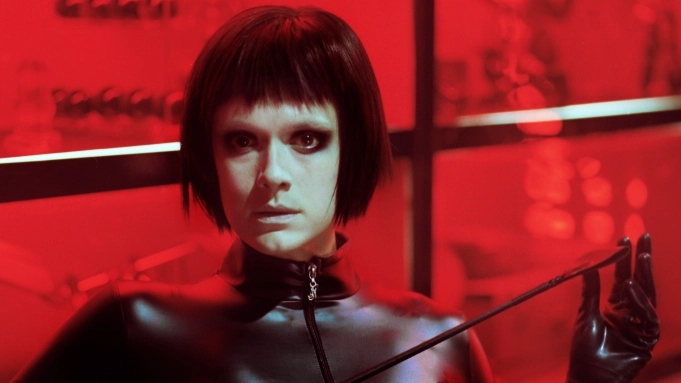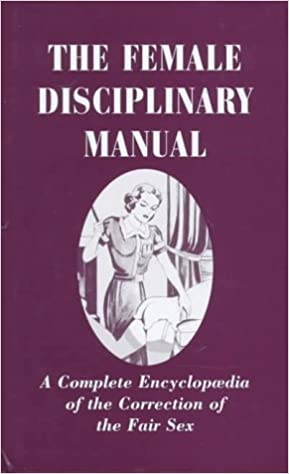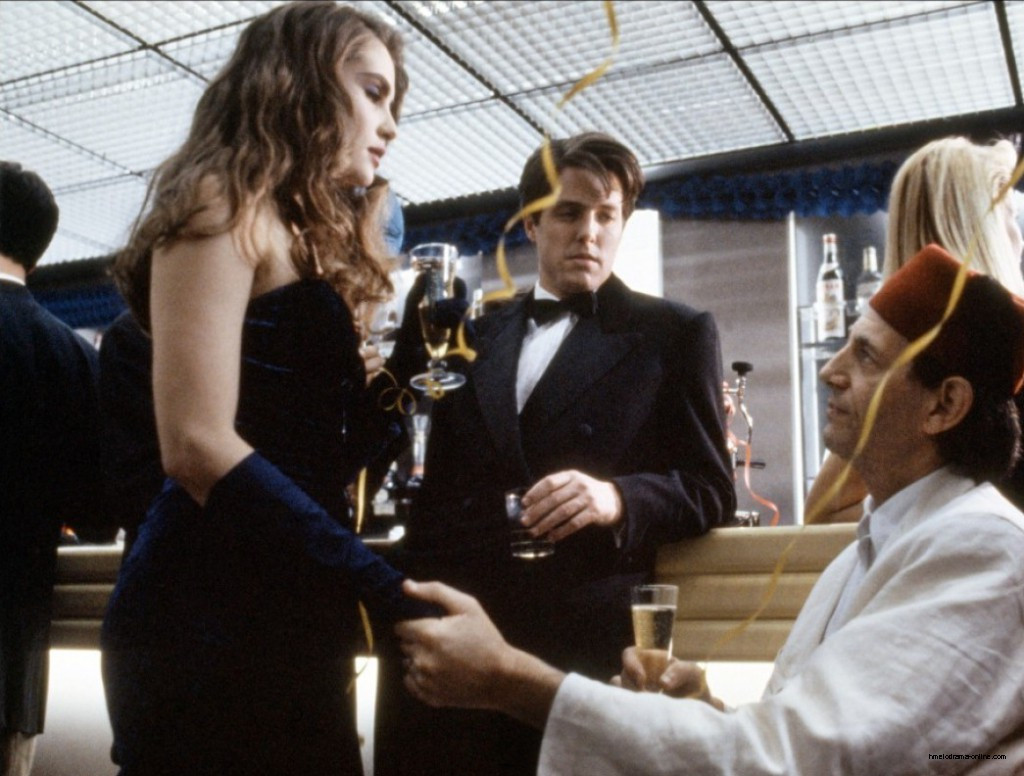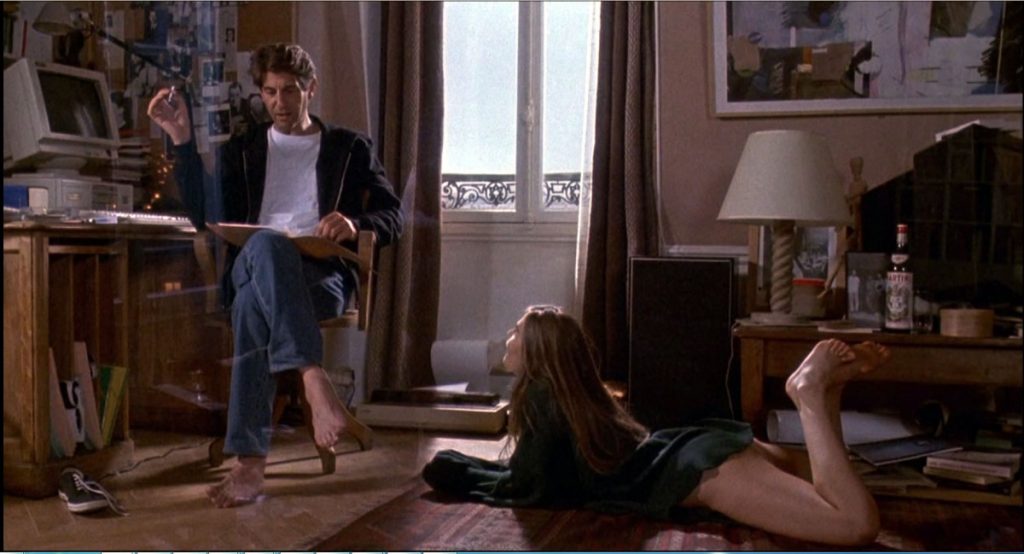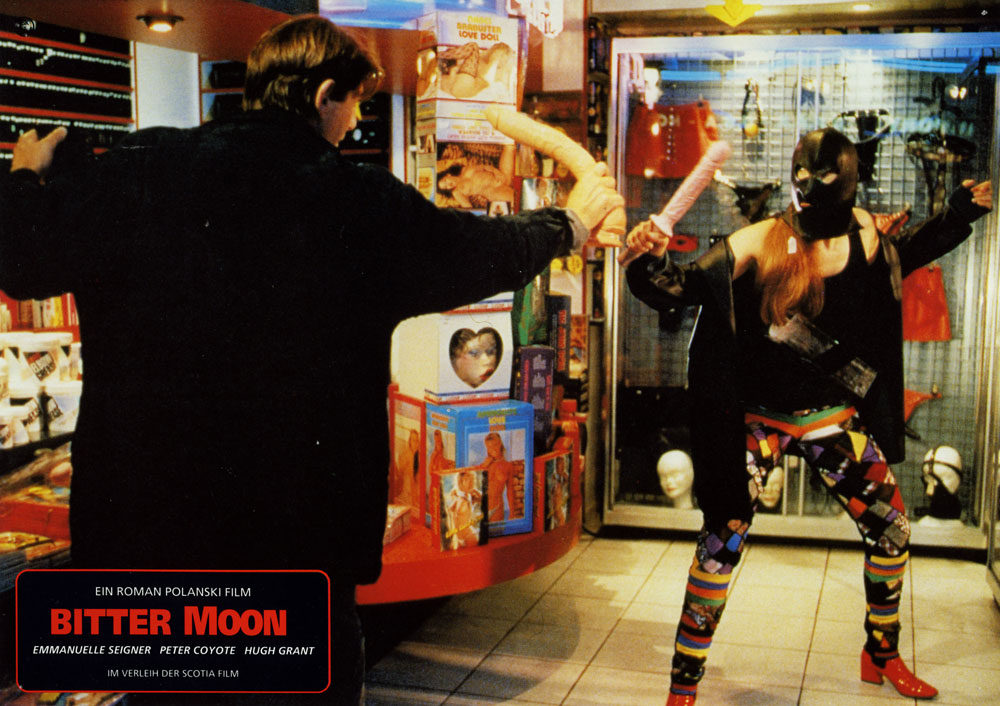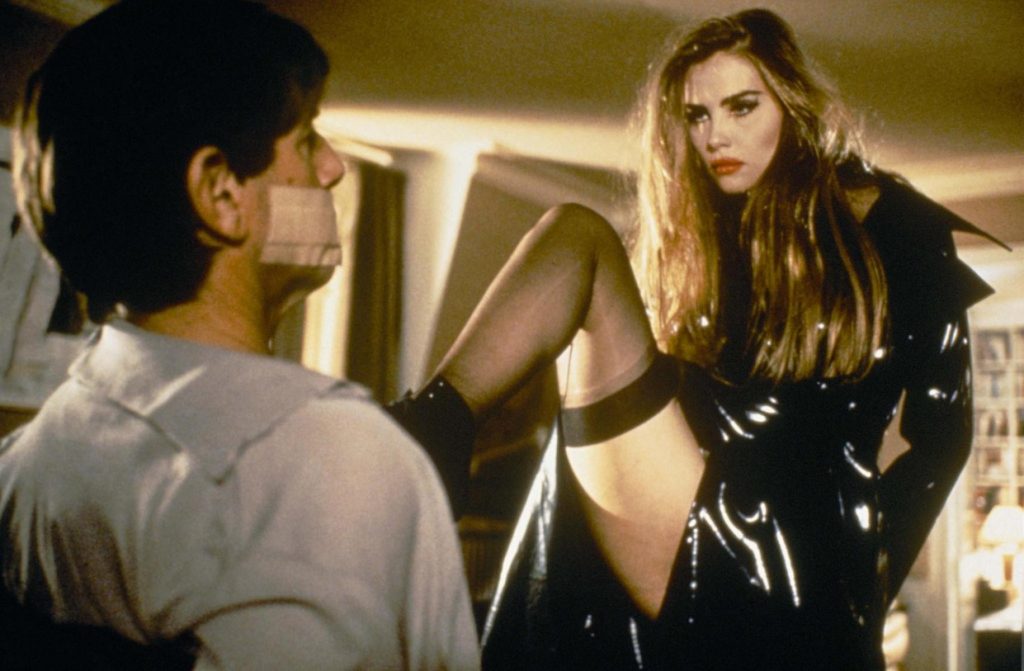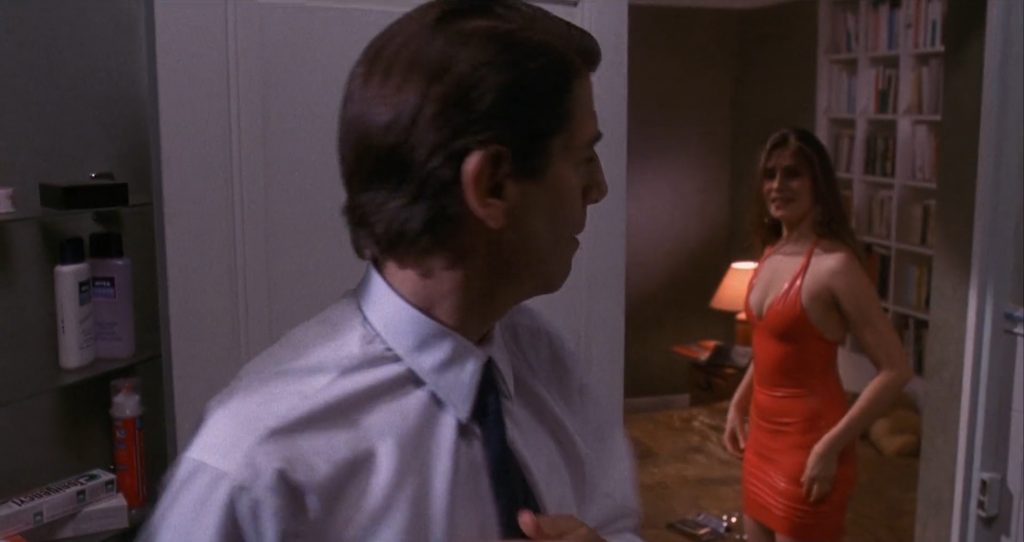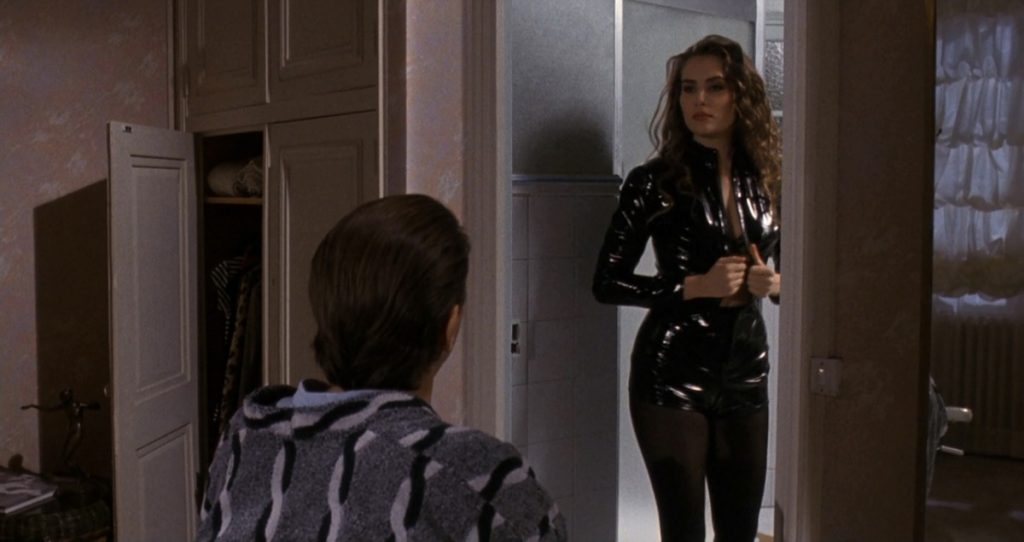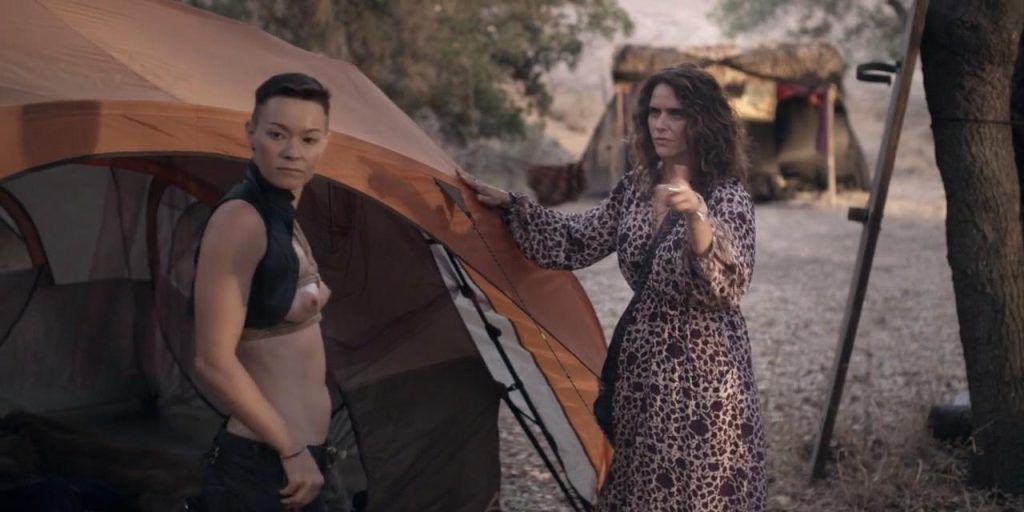S04E01
Chuck speaking with Charles, his father.
Charles: “I would slap your face and tell you to act like a man if I didn’t think it would turn you on.”
Chuck: “Ah, It wouldn’t, Dad. Not from you. That’s not how it works. Good lord.”
Another kinkphobic comment from Charles Rhoades, Sr.
S04E02
At this point in the story, Chuck is no longer attorney general, so he doesn’t have the power that he used to have. The power balance has shifted in his relationship with Wendy.
Wendy has a delicate position within Axe Capital’s very masculine, locker-room culture. Bonnie, one of the few female traders, deals with the flirtation/harassment with tough-girl indifference. When Wendy visits Bonnie’s birthday party, thrown by the other traders, she observes how Bonnie handles the men around her.
When one of the men states he never pays for sex, Bonnie says:
Bonnie: “No, you just beg for it. […] Act like a man. Sometimes a girl just needs to get railed. [To Wendy] Don’t you agree?”
Wendy: “Nobody wants to fuck a sexual panhandler.”
Guy: “So, how does it work in your bedroom?”
Everybody looks at Wendy.
Wendy: “Action, whenever either of us fucking wants it.”
Everybody cheers.
The truth of the Rhoades marriage is somewhat different.
Alone in their bedroom, Wendy initiates sex with Chuck. Chuck rolls on top of her, but things stop when he asks:
Chuck: “Can I get the box?”
Wendy: “This is working for me.”
They kiss a bit more.
Chuck: “Please?”
Wendy nods, without much enthusiasm.
Fade to: Big wooden box with a padlock. Bondage toys are scattered all over the bed. Chuck is sleeping soundly, nude, while Wendy sits next to him, unclothed, awake and unsatisfied.
The problem in this scene is that while Wendy initiates sex, it’s Chuck who sets it to BDSM, not vanilla. Wendy heard Bonnie’s disdain for men who are “sexual panhandlers”, but when Chuck pleads with her to get “the box”, she gives in to his demands. Afterwards, Chuck is satisfied, but Wendy is not.
We’ve seen other dominants who satisfy their partners but are left unsatisfied themselves. (See The Duke of Burgundy and Shortbus.) “Topping from the bottom” is an expression that gets over-used, and sometimes mis-used, but it applies here. Chuck sets the sexual scene with his wife, as the submissive, but Wendy, as the dominant, gets stuck doing the “work”. Maybe most of the time she’s okay with this arrangement, but not always. After all, her job is managing the volatile personalities in the pressure cooker atmosphere of Axe Capital, and she’s raising two kids. Her entire life is “taking care” of people, so when does she get someone to take care of her?
Wendy is supposed to be an expert psychologist, yet she can’t sit down with Chuck and talk about her dissatisfaction in their sexual relationship. Instead, she tracks down Troy in her new dungeon (who is not pleased to see her) and asks about switching, as if this was some obscure theoretical concept.
Troy says she has seen it in other couples.
Troy: “They were role-players, experimenting. So yes, they switched from time to time, moved off of bondage altogether. Tried exhibitionism, voyeurism, other forms of play. But that’s not Chuck, not his arousal template. For him it’s not a game. It’s rooted deep.”
Wendy assumes that the only way she can get some TLC from Chuck is to reverse their roles. Maybe Chuck and Wendy could both enjoy a scene with a different dynamic, in which Chuck is a service submissive, serving her drinks and snacks, massaging her (we know he has a thing for women’s feet), bathing her, etc. Or maybe she could assert herself and just say “I want vanilla sex tonight, not BDSM.”
Troy, however, states Chuck can’t switch (not “won’t”). BDSM isn’t something Wendy and Chuck do for mutual enjoyment; it’s a compulsion for him, and Wendy gets stuck with the emotional labor of managing it. Troy’s supposed expertise lets Chuck off the hook for his behavior, and puts all the burden on Wendy.
Characters in Billions are very transactional in their relationships. Everything is a negotiation, whether for money or for favors. Furthermore, there are winners and losers. In this case, Wendy feels like a loser.
Wendy looks to Bonnie for an alternative way of being a woman in a man’s world.
Wendy: “Do you ever worry that at some point, the armor won’t come off? Is that why you need a guy who doesn’t beg, takes charge?”
Bonnie: “Tell me when you find one. […] You mean do I want to sublimate my authority at home, with someone who’s masculine in all the right ways, but not a douchebag? Let them take care of me but make the decisions. Or do I want to be the shot caller? Maybe pay all the bills and end up with someone who will swallow all of that?”
Wendy: “Yeah?”
Bonnie: “When I get home from work, if I didn’t go drinking, and sometimes even if I did, I lace up the Nikes and I run the Westside highway until I forget that I want anything at all. And then I come back here.”
When Bonnie says, “Act like a man. Sometimes a girl just needs to get railed.” she’s both teasing the men around her with the possibility that they might get to “rail” her someday, and expressing her fatigue with the sexual gate-keeping and pace-setting labour demanded of heterosexual women. The only way to win this particular game is to be the “tough girl” who is too demanding for them.
But for all her sexual bravado, Bonnie lacks both pleasure and companionship. Bonnie’s solution to the problem of the costs of being in a relationship that is necessarily dominant or submissive is to stay out of relationships. Whatever sexual or emotional needs she has, she suppresses by running by herself. This is the solution Wendy also adopts at the end of the episode.
According to IMDB, this is Clara Wong’s last appearance as Troy on Billions. It’s disappointing that we didn’t get to know more about Troy or her relationship with the Rhoades.
S04E04
On the day of the primary election for Chuck’s run for Attorney General, political operator Foley threatens to reveal Chuck’s “degenerate sex life” to make him drop out of the race.
Chuck meets with Wendy, who says his campaign is over. When Chuck considers taking the hit and carrying on, Wendy says:
Wendy: “You’ll still lose and we’ll be a laughing stock. […] Our behaviour is so far outside that [Overton] window that it might as well be on fucking Mars. […] And don’t forget part of you wants the humiliation. Needs it, but I don’t. I can’t live with it. I won’t live with it.”
She frames this as a joint decision.
Wendy: “We’ll find the next adventure together.”
At the press conference, Chuck changes his mind. As Wendy and almost the entire cast of the show watches on TV, he says:
Chuck: “In my private life, in the confines of my happy marriage, with my consenting wife, [long pause] practice sadomasochism. […] Uh, yeah. Bondage, dominance, all the rest. Masks, binds, ropes, fire. Wow, uh. Even just saying that I can feel my shoulders loosen for the first time in decades. I am a masochist. In order to achieve sexual gratification I need to be tied up, punched, pinched, whipped, kicked or otherwise tortured. By my loving wife.”
Chuck makes a plea to universality, that everybody needs something a little embarrassing, and frames his admission as an act of honesty and courage, desirable in an elected official. He also emphasizes that this is part of his marriage.
Wendy interrupts Chuck’s victory party and confronts him alone. Chuck is all excuses. Chuck frames his admission in terms of truthfulness and trust, but he betrayed his wife in the process.
In the previous episode, Troy said that Chuck’s masochism is something deeply rooted, and Wendy’s comment in this episode suggests it may go over the line into self-destruction, regardless of the consequences to himself or others.
S04E05
In earlier seasons, when Chuck violated Wendy’s trust by looking at her patient notes, Wendy separated from him. Now, after an even greater violation of trust, Wendy is still with him and impotently snipes at him.
Chuck: “If the only way I could eat this pizza was naked, in the middle of Times Square, I would.”
Wendy: “Yeah, you would. You might even prefer it. The problem is, you’d be sure to undress me, too. Whether I wanted it or not.”
For Wendy, the problem is she can’t control how people see her anymore.
Wendy: “There’s this giant thought bubble sitting there between us and it features me with whips and chains.”
At work, Wendy avoids everyone.
Bobby: “This makes you more of an exotic species they [the traders] have to impress with their alpha dog energy.”
He also says she is making this bigger than it is, and either confront it or let it go.
Wendy googles herself, and finds people are talking about her. She hacks the email of a former Axe Capital trader to find out what people are saying about her. While there is a lot of crass commentary about her, she finds she stops caring about it.
Wendy: “The thinnest Google search reveals people are fucking obsessed with me. They want to know what whips I use, what bustier I wear, what Chuck sounds like when he squeals. […] Thing is, as I read it, it stopped mattering. Stopped really being about me. Stopped having anything to do with me because I don’t know these people and they don’t know me.”
She also lurks on the discussion at Taylor’s company, and sees Taylor defending her. She returns Taylor’s call of support.
S04E06
At the Rhoades house, Chuck has been sleeping in the guest room. He and Wendy talk in the master bedroom. Despite how much he wants BDSM play, he still asks Wendy for permission to see a professional dominant.
Wendy is shocked to see that Chuck has been walking around all day with a safety pin through his left nipple. His masochism may have crossed the line into self-harm. Wendy, sick of the whole situation, lets him, and takes herself and the kids out for the night.
As Troy has severed her relationship with the Rhoades, Chuck calls in a new dominatrix to his house. This is the first appearance of Alba as Cassie. Her first act, after taking off her coat and revealing her domme outfit beneath, is to punch Chuck in the eye. Later, Wendy comes home and finds Chuck in the bathroom, covered in scratch marks and trying to conceal his black eye with her makeup.
Chuck: “Wendy, what I did tonight, I can’t live without. And I won’t.”
One of the most common requests to pro-dommes is to not leave visible marks on the sub’s body. Either Chuck failed to specify this when he hired Cassie and she plays very rough, or he specifically ordered her to do this. We know that Chuck can be compulsive about his masochistic desires, as far back as season 1. Previously, he’s managed to keep it under control, sometimes with Wendy’s help. Now he is either unable or unwilling to moderate his actions, regardless of the consequences to his career or family. Guilt is a trigger, and Chuck may be losing control because he feels so much guilt, creating a feedback loop.
It’s disappointing to see that, instead of exploring how BDSM works in an established marriage, Billions chose to make Chuck an out-of-control masochist and Wendy just his co-dependent wife, not a woman who takes her own pleasure in kink. (Recall that Wendy masturbated when she was on the phone to Chuck in the club in Season 1.) Wendy could have been the rarest of characters: a female dominant who is not professional.
S04E07
As the Rhoades marriage further deteriorates, Wendy puts their house on the market, and Chuck pleads with her to stay with him.
He tells her a story from his childhood, about how his father would knowingly psychologically abuse his mother, ruining any sense of a loving home. His father told him, “A woman has a subconscious desire to be dominated. Remember that. Use it.”
Chuck: “That’s where I come from, Wend. I don’t get violent, throw things or cheat. But I can’t seem to be normal either. I’m trying, though. As hard as I know how. And I implore you, don’t put our home up for sale.”
Wendy refers to his own abusive moment on live TV, when he admitted his masochism, putting his desires ahead of hers.
Wendy’s separation from Chuck is understandable, but she’s in her own downward spiral. She uses her emotional bonds with Taylor and Mafee to help set up a situation in which Taylor has to put their company ahead of their relationship with their father. This doesn’t benefit her in any way. She is just playing along with Bobby’s grudge against Taylor. It takes Mafee busting into Axe Capital and calling her a “garbage person” to her face to make her realize how far she’s fallen.
Chuck comes home late to find the house on the market, and Wendy breaks down crying on her nightly run.
Is Billions shaping the story so that BDSM is purely Chuck’s problem, and Wendy is off the hook for it, making her the “normal” one?
S04E09
Wendy calls Chuck a “power bottom”.
S04E12
Chuck is in session with Cassie. He’s hanging suspended, horizontal and face down in an elaborate harness. The location is a dungeon, presumably Cassie’s.
Chuck: “I’m not ready.”
Cassie: “Worm is always ready for the hook.”
Chuck: “No, not ready. Let me down.”
Cassie turns the crank.
Chuck: “No, seriously. Red!”
Cassie: “Ah, the safeword. So you don’t think you’ve earned your punishment yet? Fine. Don’t come back until you have.”
[Is he supposed to get out of that by himself?]
Wendy’s medical license is suspended after she confessed to wrongdoing, but Chuck wants to try to change it before it is official. He later does it and she just gets a verbal warning. However, she realizes Bobby actually bribed the review board and Chuck did nothing. She packs a bag and leaves. She goes to Bobby’s penthouse, and spends the night in the guest room. Definite sexual tension.
After setting up Taylor as his double-agent within Axe Capital, Chuck goes to the dominatrix. “Now I’m ready. I’ve earned it. String me up.”
Chuck is suspended again and being whipped.
Conclusion
Chuck’s on-air confession of his sadomasochism actually doesn’t have any costs to his professional life. He still becomes Attorney General for New York State. Anybody who thinks poorly of him for it already did.
We also don’t see any impact on his children. (The Rhoades’ children barely appear in this season.)
Chuck’s act of betrayal has massive consequences for Wendy, however. Not only did he completely ignore her demand, she’s lost control of her public image, even in the realm of Axe Capital where she’s the symbolic queen. It contributes to her downward spiral over the season, until she betrays Taylor’s trust and her ethical code as a doctor.
There’s still a lot unestablished about Chuck and Wendy’s kink practices. In season 1, we did see Chuck could be compulsive about his masochism, and his relationship with Wendy helped him moderate it. When he felt guilty and went to a club without her, he stopped and called her. She turned the incident into an experience of mutual pleasure, as seen when she masturbates when on the phone with him.
ConclusionIn this season, Wendy has lost interest in kink for her own enjoyment. Now, BDSM is something Chuck needs, and Wendy does because she views it as her job. As Wendy separates herself from Chuck, he still asks her permission to see a pro domme, and she agrees. This paints BDSM as Chuck’s thing, which it always was, and she’s just a vanilla woman. She was the victim, not the co-conspirator.
This is the easy way out for the writers, rather than deal with the complexity of a sexually dominant woman who wasn’t a professional. It’s also disingenuous, when the first thing we ever see of Wendy is her urinating on Chuck’s chest. Even her costuming (form-fitting dark colors with gold or silver chains and spike heels) is deliberately chosen to suggest a dominatrix, as revealed by the costume designer.














